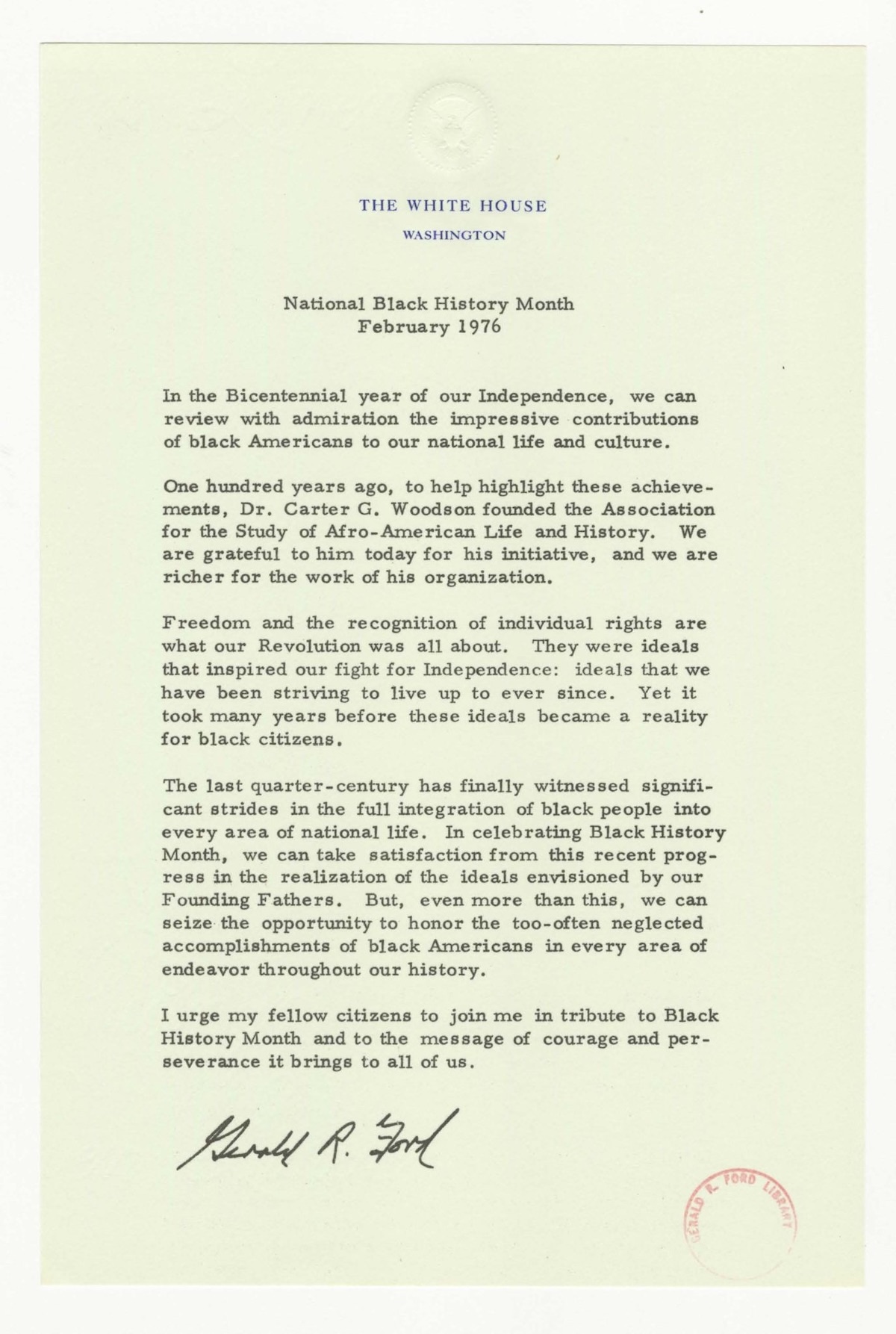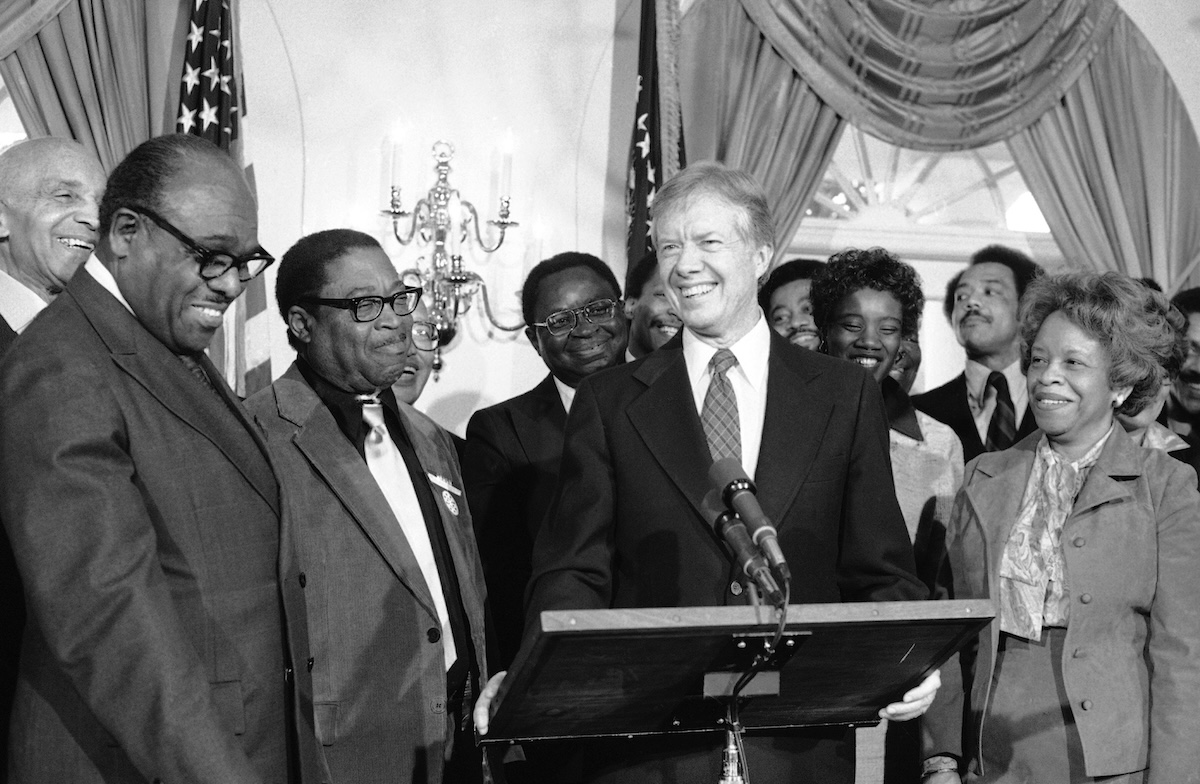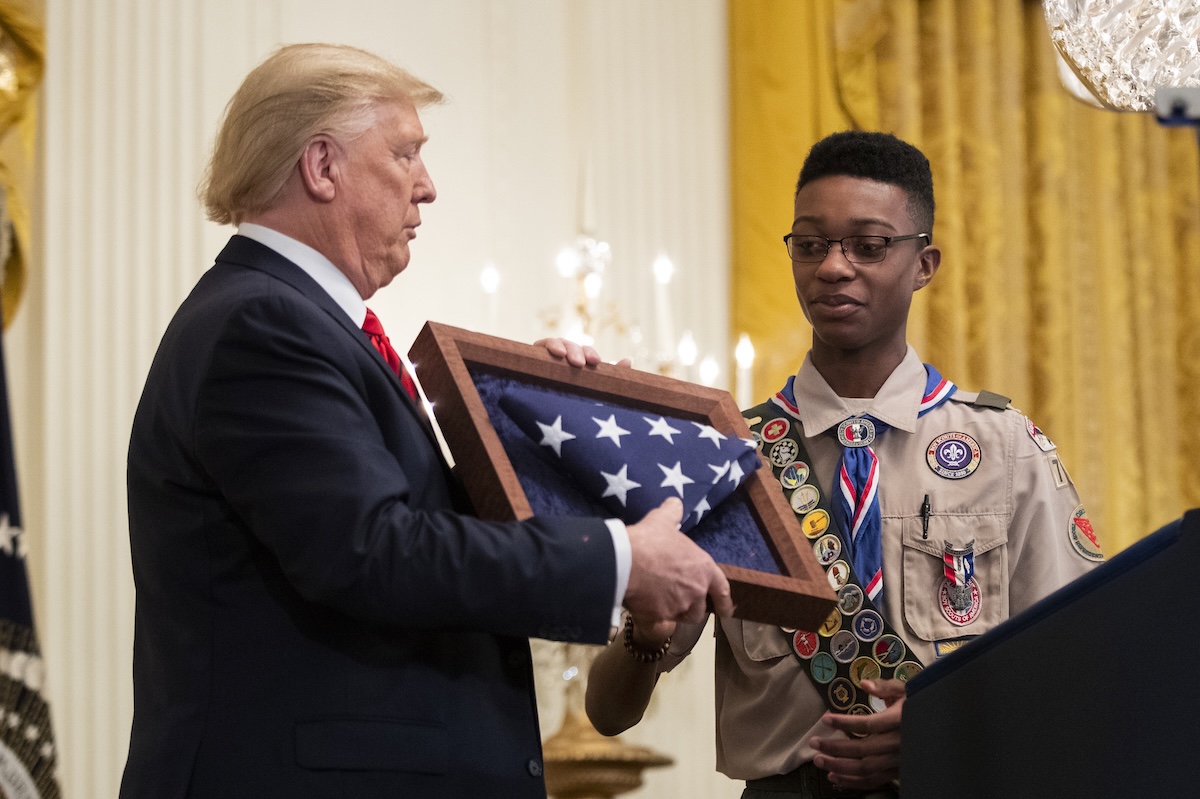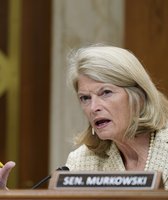Get PolitiFact in your inbox.
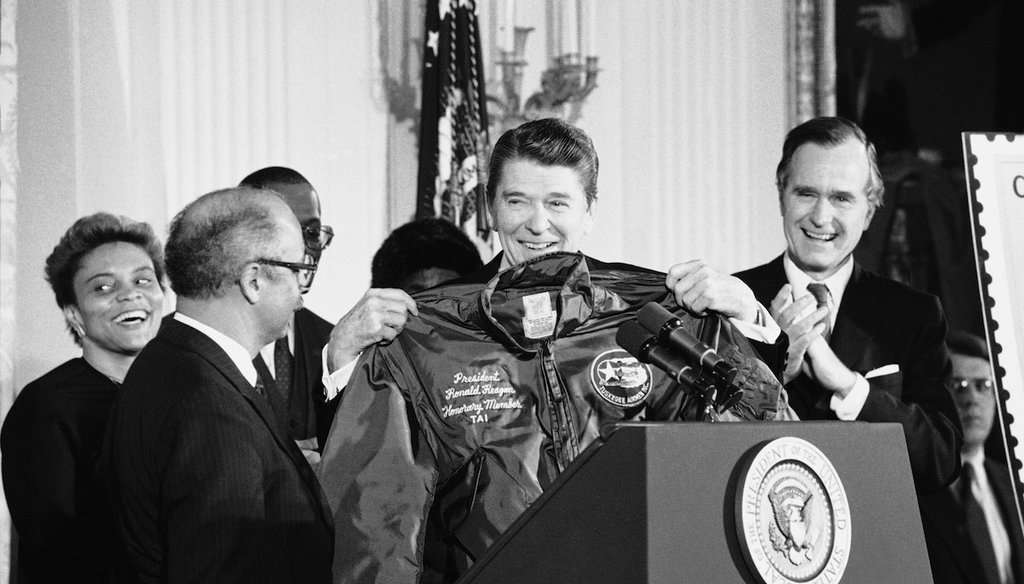
President Ronald Reagan receives a jacket making him as honorary member of the Tuskegee Airman Inc. in conjunction with Black History Month, Feb. 2, 1984, during an Oval Office ceremony. (AP)
If Your Time is short
-
Following President Donald Trump’s executive order ending all diversity, inclusion and equity programs and activities within the federal government as evidence, some social media posts speculated about whether Black History Month observances could be paused or halted.
-
The White House has not publicly and explicitly forbidden the February observance; and a White House press secretary said Jan. 28 that the “White House certainly still intends to celebrate.” But at least one federal agency has told staff it’s pausing Black History Month observance in response to Trump’s order, according to The Associated Press.
-
If Trump doesn’t issue a proclamation for Black History Month as he did every year of his first term, it would be a departure from nearly 50 years of presidential actions. But a lack of a proclamation has no effect on the right of private citizens to observe it.
UPDATE, Jan. 31, 2025, 7 p.m.: President Donald Trump issued a Friday evening proclamation recognizing February 2025 as National Black History Month. "I call upon public officials, educators, librarians, and all the people of the United States to observe this month with appropriate programs, ceremonies, and activities," he wrote. It was not immediately clear what this could mean for any federal agencies that interpreted his executive orders to prohibit Black History Month activities.
President Donald Trump made very clear he is prioritizing ending federal support for diversity, equity and inclusion efforts. A week into office, his executive orders targeted DEI in the military, health care and federal spending.
Less clear: where that leaves federal recognition of Black History Month, the February-long observance honoring Black Americans’ stories, achievements and contributions to United States history, life and culture — a celebration that every U.S. president in the last five decades has recognized with an official message or proclamation.
On social media, some speculated Black History Month was off under Trump.
"The Federal Government has canceled the Black History Month celebration 2025," a Jan. 24 Instagram video proclaimed to the soundtrack of Luther Vandross’ 1985 song "It’s Over Now."
"Federal agencies will not acknowledge Black History Month this year," another Instagram post said Jan. 23.
TheGrio’s White House correspondent April Ryan asked White House Press Secretary Karoline Leavitt during the administration’s Jan. 28 press briefing about the White House’s plans.
"As far as I know, this White House certainly still intends to celebrate and we will continue to celebrate American history and the contributions that all Americans, regardless of race, religion or creed have made. And America is back," Leavitt answered.
A day later, independent journalist Ken Klippenstein shared on Bluesky a picture of a Defense Intelligence Agency memo dated Jan. 28 that called for a pause on "special observances hosted throughout the year," including Black History Month, Martin Luther King Jr.’s birthday, Holocaust Days of Remembrance and Juneteenth.
The federal government and Black History Month
Black History Month’s origins date back to 1926, when historian and educator Carter G. Woodson proposed celebrating "Negro History Week." February made sense because Black Americans already marked President Abraham Lincoln’s Feb. 12 birthday and slavery abolitionist and author Frederick Douglass’ adopted Feb. 14 birthday. (Douglass was born into slavery and did not know his actual birth date.)
Communities, schools, colleges and cities mostly observed the weeklong celebration at the local level before the 1960s Civil Rights Movement raised awareness of Black identity, prompting people to mark off the entire month for celebrations.
In 1975, Republican President Gerald Ford became the first president to officially recognize Black History Week as a dedicated period to highlight Black Americans’ distinct contributions.
"With the growth of the civil rights movement has come a healthy awareness on the part of all of us of achievements that have too long been obscured and unsung," Ford wrote in his presidential message that year.
By 1976, as Ford sought to increase outreach to Black communities, he issued a statement recognizing what, by then, Woodson’s Association for the Study of African American Life and History had expanded to a monthlong observance.
"We can seize the opportunity to honor the too-often neglected accomplishments of Black Americans in every area of endeavor throughout our history," Ford wrote in a presidential message he titled, "National Black History Month."
Reagan obliged.
What if Trump doesn’t issue a proclamation in 2025?
Much like congressional resolutions, presidential proclamations are largely ceremonial gestures and "do not have the force and effect of law," the Library of Congress said. And unlike Thanksgiving, which traditionally also receives a presidential proclamation, Black History Month is not a federal holiday.
If Trump explicitly bans or does not proclaim the observance, there would likely be public backlash and confusion. But experts said that the elimination of that presidential recognition would have little practical effect.
"The proclamation is communicative, not substantive; the absence of a proclamation doesn’t eliminate a tradition, where one exists," Bowdoin College government professor Andrew Rudalevige wrote in an email.
However, if Trump doesn’t proclaim the month, he would depart from how federal agencies and their leaders often observe the occasion. In recent years, Cabinet secretaries have issued statements and participated in activities designed to celebrate African American pioneers.
In 2023, NASA published a video honoring pioneering Black women mathematicians who contributed to early space exploration programs and NASA’s first Black astronauts.
In Trump’s 2020 Black History Month proclamation, he specifically urged "public officials, educators, and all Americans to observe this month with appropriate programs, ceremonies, and activities."
Given Trump’s executive order calling for the termination of all DEI "mandates, policies, programs, preferences, and activities in the Federal Government, under whatever name they appear," the future of such activities is in question.
The Office of Personnel Management, the federal government’s human resources department, called for the end of DEI-focused webpages and began laying off employees who work in diversity-related fields.
"These programs divided Americans by race, wasted taxpayer dollars, and resulted in shameful discrimination," Charles Ezell, acting director of the Office of Personnel Management, said in a Jan. 21 memo to federal agency heads.
Asked about the claim that Trump had canceled Black History Month, an Office of Personnel Management spokesperson directed us back to Ezell’s memo, which doesn’t specifically mention the observance.
"It wouldn’t be illegal for a government agency to carry on with commemorative programming in the absence of the proclamation," Rudalevige said. "But it would be unlikely, especially as this administration has put out a series of rhetorically-charged directives regarding race."
The rights of private companies and people to observe Black History Month would be unaffected.
"We do not celebrate because we are given permission, we celebrate because we are the permission givers," Karsonya "Kaye" Wise Whitehead, national president of Association for the Study of African American Life and History, said in a statement. "We do not wait for Black History Month to be proclaimed, we proclaim it. We do not wait to be seen, we see ourselves."
PolitiFact Researcher Caryn Baird contributed to this report.
Our Sources
Instagram video (archived link), Jan. 24, 2025
The White House, Ending Radical and Wasteful Government DEI Programs And Preferencing, Jan. 20, 2025
The Association for the Study of African American Life and History, The Origins of Black History Month, accessed Jan. 27, 2025
U.S. Office of Personnel Management, Initial Guidance Regarding DEIA Executive Orders, Jan. 21, 2025
Library of Congress, Executive Order, Proclamation, or Executive Memorandum? Jan. 28, 2025
ABC News, A look at what DEI means amid Trump executive orders, Jan. 24, 2025
National Archives, Recognition of Black History Month, Feb. 1, 2024
Library of Congress, Black History Month: A Commemorative Observances Legal Research Guide, Jan. 28, 2025
Visit Raleigh, The Carolinian Newspaper, accessed Jan. 28, 2025
TheGrio, Fact check: Did President Donald Trump ‘cancel’ Black History Month?, Jan. 27, 2025
The American Presidency Project, Recognition: The Role of Presidents, Feb. 11, 2024
The Smithsonian Institution, Celebrating Frederick Douglass through Transcription, accessed Jan. 27, 2025
Email correspondence with Bowdoin College government professor Andrew Rudalevige, Jan. 29, 2025
Email correspondence with John T. Woolley, co-director of the University of California, Santa Barbara’s American Presidency Project, Jan. 27, 2025
Email correspondence with Defense Intelligence Agency spokesperson Seth Clarke, Jan. 29, 2025
Gerald R. Ford Presidential Library and Museum, Key Speeches and Writings of Gerald R. Ford, accessed Jan. 28, 2025
The White House, Proclamation on National African American History Month, 2020, Jan. 31, 2020
Instagram, Washington Association of Black Journalists, Jan. 28, 2025
Bluesky, Ken Klippenstein, Jan. 29, 2025
PolitiFact, Ask PolitiFact: What is Juneteenth and when did it become a federal holiday?, June 17, 2022
The American Presidency Project, Proclamation 5443—National Black (Afro-American) History Month, 1986, Feb. 24, 1986
The Associated Press, Pentagon agency pauses celebrations for Martin Luther King Jr. Day, Black History Month and more, Jan. 29, 2025
Defense Intelligence Agency, Throwback Thursday: Colonel Charles Young, America’s First African American Military Attaché, Feb. 13, 2014
Defense Intelligence Agency, Black History Month: Col. Charles Young, Feb. 24, 2020
The White House, Presidential Proclamation -- Thanksgiving Day, 2016, Nov. 23, 2016
History, Black History Month, Jan. 29, 2024
Reagan Library, President Reagan’s Remarks at a Black History Month Ceremony, Feb. 2, 1984
Library of Congress, National American Indian Heritage Month: A Commemorative Observances Legal Research Guide, Jan. 28, 2025
Library of Congress, National Hispanic Heritage Month: A Commemorative Observances Legal Research Guide, Jan. 28, 2025
Library of Congress, Asian/Pacific American Heritage Month: A Commemorative Observances Legal Research Guide, Jan. 28, 2025
The American Presidency Project, Proclamation 9696—National African American History Month, 2018, Jan. 31, 2018
X post, NASA (archived link), Feb. 1, 2023
X post, Steven Mnuchin, Feb. 13, 2018
Apple, Apple introduces the 2025 Black Unity Collection, Jan. 27, 2025
Target, Black History Month, accessed Jan. 28, 2025

